The immigration debate is being framed as the primary sticking point in the government shutdown. Even before the most recent theatrics, immigration has been front-and-center for much of President Trump's first year in office and his campaign.
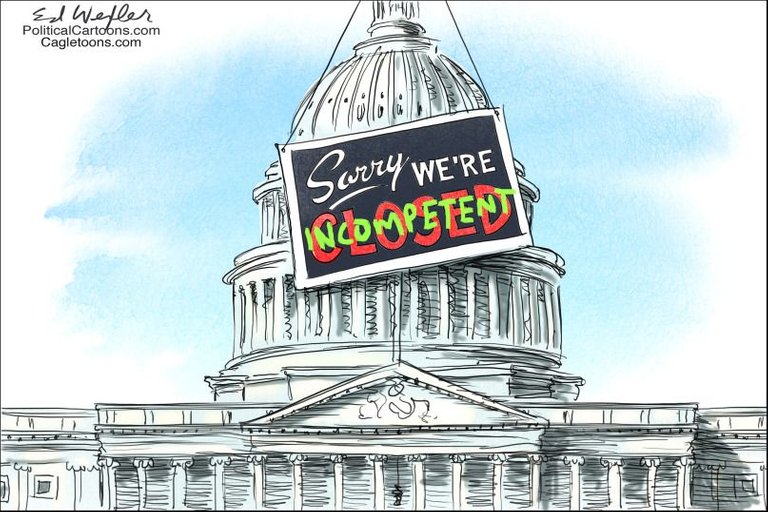
As the topic saturates the U.S. political dialogue, it is worth a step back to ask what it is that politicians are actually debating.
On the right, Trump's so-called border wall has taken center stage. Long before the current President led cries of "build the wall" at his campaign rallies, the Republican party immigration platform has focused on border security and law enforcement, recognizing the energy that such topics bring to their base.

On the left, the Democratic party is holding up the banner of the Dreamers, placing DACA on the top of their priority list for immigration policy. In 2012, when DACA was first signed, I attended a workshop organized by La Raza in DC. Although the (liberal) Latino organization was grateful for the progress, they did not fail to notice that President Obama held off on immigration reform until an election was around the corner. (Not to mention conducting unprecedented numbers of deportations - which would continue after the mid-terms.)
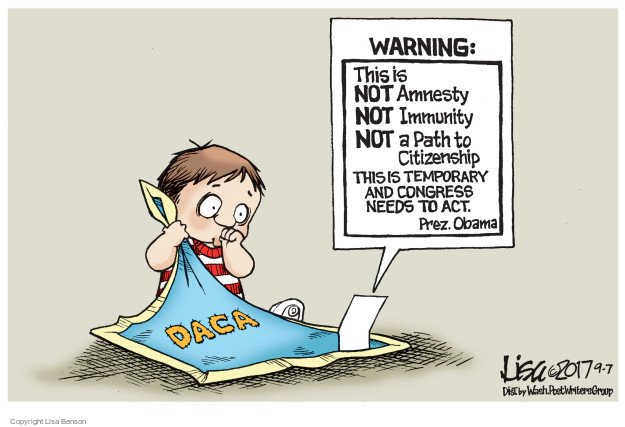
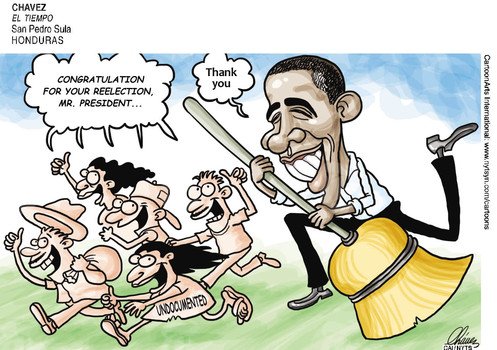
Law enforcement and child protection are politically potent issues. They make great slogans and media banners because they are tied to emotion and pre-existing opinion frameworks. As such, they account for much of the publicly debated immigration policy reforms since President Reagan's Immigration Reform and Control Act in 1986.
The major immigration bills that followed have each focused on these same politically salient issues of guns, jobs, and children.* Deciding which ethnicities may enter the country and what is the right way to split up a family is only the flashy surface of U.S. immigration policy. It is the mundane bureaucratic and administrative reforms that have the potential to make a lasting difference in how immigrants enter and integrate into US society.
*The administrations of Clinton and Obama each passed legislation with the stated objective of comprehensive immigration reform - however, advocates and legal service providers have largely argued that these regulations made the process more difficult.
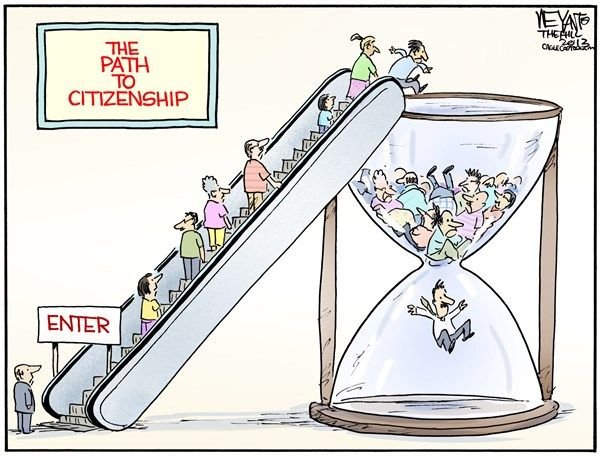
I first became aware of the deeper problems in the immigration system while working in restaurants as an undergraduate. It is common knowledge that many restaurant kitchens are staffed with under-payed immigrant labor, many of whom are undocumented, and without whom the price of food in these places would prove prohibitive for much of the standard clientèle. What may be less obvious to the casual diner, is the prevalence of immigrants that make up the so-called front-of-the-house staff in the service industry.
There's the baby-faced, kind-hearted gentleman from Costa Rica, whose goofy humor and traditional mannerisms easily put all of those around him in a better mood. The Latvian woman who frequently brings delicious home-made treats to share and the Pakistani kid who knows all the best lunch spots.
As a political science major, I loved helping my colleagues study for their citizenship exam. I remember most how their emotion rose and fell with each index card, gaining confidence as they did well and chastising themselves when they did poorly. If they became particularly discouraged, I would ask one of my fellow US citizens the same question they had just missed.
The test was not most disheartening part of the process, however - not by a long shot. In fact, as of September 2016, the average pass rate was 91%. The performance statistics for this test are impressive, with all demographics typically scoring in the 80-90 percentile.
My Latvian colleague, whom I mentioned earlier, was especially enthusiastic to take her exam. She told me she had waited more than 40 years to do so. (She was including the time it took her to obtain a green card.) Between the paperwork, the fees, the lawyers, more fees, and more paperwork, she was grateful to finally have the opportunity to jump this hurdle.
As I came to know other immigrants and applicants for U.S. citizenship, I learned that, while her case was particularly frustrating, it was not altogether unusual.
Obtaining a green card for the family member of a U.S. citizen can take more than two decades. Obtaining a job-based green card involves multiple moving parts and is an increasingly costly and frustrating process. In addition to the application fees, fees for an immigration lawyer for the green card process can range from $5,000 - $15,000. Recent articles on green card applications present anecdotes describing the experience as invasive, paralyzing, and opaque.
“Even before anything goes wrong, green card cases can take a long time mainly because of backlogs at the INS,” Steve Ladik, president of the American Immigration Lawyers Association and Dallas attorney, told ABC last year. “A typical company sponsorship case in Dallas has a 24-month wait before the INS even looks at the file.”
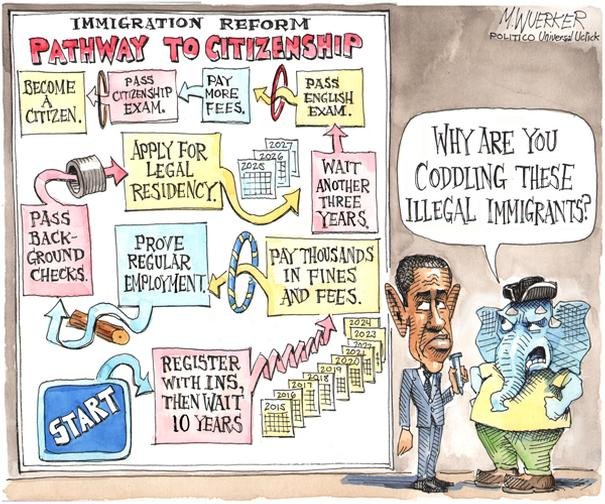
Immigrants who enter the U.S. without a green card have no existing route toward citizenship unless they can claim asylum or refugee status. (The U.S. (arguably) has consistently violated the Refugee Convention, meaning that even attempting to take advantage of this option could be more dangerous than continuing to live as an undocumented immigrant.)

Most green card holders (or legal permanent residents -LPRs) must spend five years in the U.S. before beginning the naturalization process to become a citizen. In 2015, the American Immigration Council found that, of the 13.3 million LPRs in the U.S., 8.8 million were eligible for citizenship. Yet, according to the National Partnership for New Americans, only 8.9 % of those eligible had applied in 2013. This despite a 2012 Pew Hispanic survey which found 96% of participating green card holders wanted to naturalize. Several studies (here is one and here is another) found that current policies have caused systemic structural barriers to naturalization.
The first among these barriers is cost. The total cost to apply for citizenship is currently $725, up from $680 in 2015 and $400 in 2005.
The Congressional mandate for the U.S. Citizenship and Immigration Service (USCIS) dictates that these fees must cover the entire cost of their operations. The fees, which have been found to be prohibitive since 1998, have steadily increased ever since. Only recently has this cost been approved for payment via credit card and there is no family cap, meaning each individual applicant is charged the full amount.
If an applicant is denied at any point in the process, the fees are non-refundable. Natural anxieties about one's ability to perform in a second language is another repeatedly cited reason for not beginning the application process - an inability to comprehend the context of the language could result in the permanent loss of a significant amount of money.
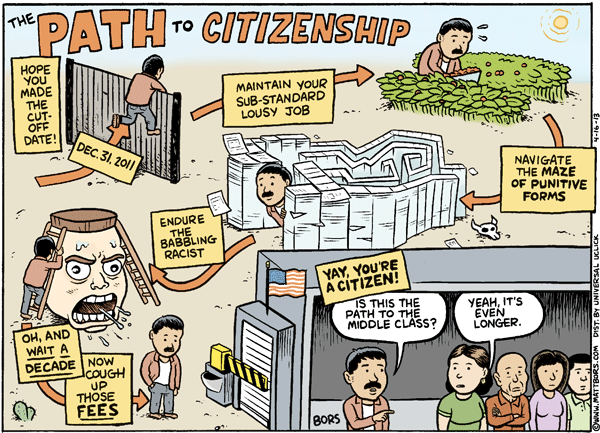
Cost is only the beginning of the difficulties faced by LPRs attempting to earn citizenship. In 2000, the Catholic Legal Immigration Network, Inc. (CLINIC) conducted an extensive review of the procedures of the U.S. Citizenship and Immigration Services (USCIS). Here are a few of their findings:
(For more information, access the full document here. Italicized text was taken from additional sources.)
Lack of Accessible Information.
There are no existing national initiatives to inform immigrants of naturalization eligibility requirements. USCIS offers no information regarding citizenship prior to or after entry into the US, or when a status change occurs. An unauthorized industry of "notarios" has risen to fill this void, taking advantage of uninformed populations with high fees charged often simply to obtain free forms or information.
Failure to Standardize and Extend Fee Waivers.
The cost of the process is increasingly prohibitive. USCIS has wide discretion over fee waiver approval. The USCIS has not produced a standard application form and applicants must turn to legal counsel or a charity to create a form for them. Many applicants do not know this is available. Waivers are often denied or delayed due to the processing errors caused by, among other things, a lack of standardization. The fee waiver is available for applicants who are able to demonstrate incomes up to 150% of the federal poverty line. There are no partial waivers available for those who do not qualify.
Lengthy and Complex Application Form
The application form contains over 100 questions with many requiring fully written (vs. "yes" or "no") answers. Within the application's six pages of instructions, USCIS has estimated that completing the form should take "six hours and eight minutes." This estimate is based on the assumption of a native English speaker. Many applicants are discouraged outright by the length and complexity of the form.
The form contains up to 50 questions with legal consequences. "Many questions require knowledge of naturalization law and the advice of a legal representative." (CLINIC p.40) Additionally, any misunderstanding that results in an incorrect answer can be interpreted by USCIS as a "lie," regardless of intention. The applicant will then be barred from citizenship for lying.
The Obama administration added additional questions to the application form to enforce new national security regulations. These questions include language described by legal immigration experts as complex and technical. Jean Atkinson, from the Catholic Legal Immigration Network in Silver Spring, Md., is quoted by the Washington Post as finding the additional questions to contain a “level of English ...significantly higher than the level required to pass the citizenship test.” The additional questions increased the length of the form from 10 pages to 21 pages. The time to complete this form has undoubtedly increased as well.
Difficulty in Obtaining Case Information.
Applicants, along with legal and Congressional representatives, consistently experience persistent difficulty in accessing even basic information about the status of cases; including: hostile staff, over-burdened appointment systems (" almost inaccessible during daytime work hours" (CLINIC p.41)), uninformed contract employees staff the "time-consuming and useless" customer service line, daily quotas for appointments and new inquiries, as well as restrictions on walk-in appointments. "Immigrants who have waited years to be called for a naturalization interview are unable to confirm with USCIS that their files are in the correct office and retrievable." (CLINIC p.41)
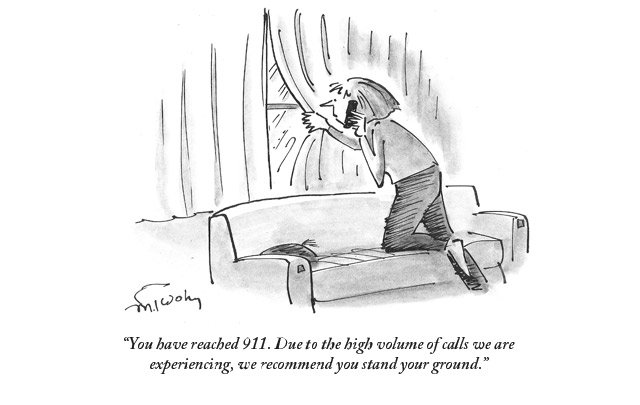
Contract Employees.
USCIS depends heavily on temporary and long-term contractual hires. These employees staff the customer services phone line and often possess only an elementary level understanding of immigration law. Data entry errors and lost forms cause significant delays, sometimes without notice to the applicant. Errors that go unnoticed result in applicants and counsel receiving no or incorrect information indefinitely.
Criminal Background Check Backlog.
FBI background check backlogs are "legendary, reaching two years in 1999." (CLINIC p.41) If the applicant has a common name, it may register a "hit" linked to the record of one or multiple other individuals with similar names. This requires investigations taking several months or years.
Disability waivers.
Waivers and accommodations are available for mentally ill or physically impaired applicants. These waivers are often difficult to obtain. The process can require legal assistance and costly medical appointments.
Several legal services websites (here's one) list common reasons for being barred from citizenship, including failure to pay taxes, failure to register with the Selective Service (a component meant to demonstrate loyalty to Constitutional principles), and failings in "good moral character." In addition to lying (which, as stated above, includes misunderstandings) and criminal history, demonstrations of "bad moral character" include "habitual drunkenness."
Streamlining and modernizing the path to citizenship would go a long way in actually reforming the immigration process in the United States. Allocating time, expertise, and resources to increase the efficiency of the legal immigration process has the potential to significantly change how migrants enter and integrate into U.S. society.
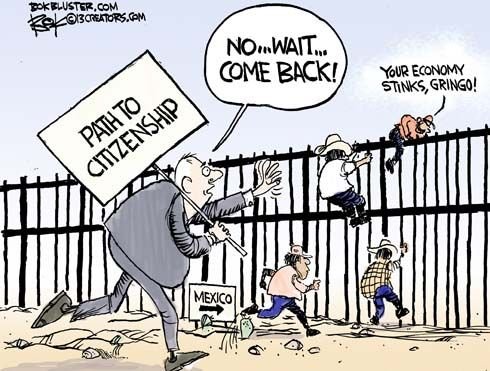
If the U.S. is to be a country of laws, we must ensure our laws are rooted in the realities of the current century. Addressing administrative and bureaucratic reform would allow the right to streamline government bureaucracy and the left to finally make legitimate progress on comprehensive immigration reform.
At the end of the day, this isn't about politics. It's about the lives of more than 13 million people who want to be a part of a revolutionary experiment in governance. Their dreams deserve the genuine efforts required to play out that very experiment in our institutions today; not to add or delete fashionable legislation - but to thoughtfully and effectively reform the citizenship process.

For additional materials on eligibility, required documents, and preparation materials: uscis.gov, www.newamericanscampaign.org, www.univisioncontigo.com/en.
For more information on notario scams: https://www.americanbar.org/groups/public_services/immigration/projects_initiatives/fightnotariofraud/about_notario_fraud.html
If you are in the Seattle area check out the Northwest Immigrant Rights Project.
Thanks for the detailed overview of the process .. I've been trying to talk sense into my crazy right-wing uncle on FB about how difficult it is already to immigrate to the USA. By focusing on immigration, Stephen Miller's favorite subject, Trump can basically just repeat talking points all the time. Its a non-issue floated out due to anti-Muslim hysteria which allows this administration to pretend to care about something, all the while ignoring real crises like opioid addiction, failing infrastructure, healthcare reform or education etc etc campaign finance anybody .. the USA is on a slippery slope and worrying about immigrants is really only empowering ICE and the police/surveillance state ...
One unfortunate side-effect of democratic elections is that politicians spend their time on what they believe their voters care about most. I think boredom and entitlement has led to a "need" to be outraged, to have an opinion, to be invested or emotionally committed to some cause. Victim hood is easy to trigger in such a social context. Politicians trigger these emotional issues and citizens vote for the individuals who make them feel validated in their cause. The cycle has spun a bit out of control in the U.S. today. Few are leading and critical issues are being swept down the road - locally and globally. Thanks for reading.
Not only in the USA .. I live in the Czech Republic and pro-Putin Zeman was reelected today on an anti-migrant platform .. I am very worried things are heading in the wrong direction and it will get worse, much worse, before it gets better again. We live in dark times. I am increasingly scared about the future.
Uh... Yuck. It is baffling to me that he won even the first time. Do you think it is primarily an immigration issue? How is the Velvet Revolution remembered there today? I am consistently shocked to see how so many in the U.S. have consistently begun to capitulate to Russia. Yet, this mindset has become even more prevalent - and even more shocking, I think - in the Czech Republic, no?
I just wrote an entry about my reaction to the election .. have a look https://steemit.com/politics/@praguepainter/the-return-of-the-iron-curtain
Very well written article. I learned a great deal about immigration and the naturalization process I never knew. Thank you!
You're welcome :) Thanks for reading!
I will share this to my FB network, I hope you get lots of reads and a new understanding from readers.
Thank you for taking the time. :) I appreciate your support.
Exceptionally well written article. Your Bio for your account says passionately analytical. Have you ever considered the idea of not having a ruling class (government) dictating the way other people should live their lives. You definitely strike me as viewing all people as equal. If you were to analyze the cause of the immigration "problem" I think you would be able to conclude that the issue is that we have a ruling class. The problem is not with people trying to peacefully co-exist, but with tyrants who dictate to us from high. Doesn't matter what the difference in people is, as people are people, all equal, and if viewed in that lens, what right does any other person, congressman, president, prime minister have to tell us otherwise? Those people are the ones creating the divisions, problems, and strife. Because they need a customer to sell their solution to.
I appreciate your compliment. I spent quite a bit of time as an undergrad considering the concept of anarchy. Rousseau asserts that government arose out of the need for the "haves" to protect themselves and their valuables from the "have nots." There was a point when I was convinced the solution to most social struggles was to eliminate not just government but also capital. Since then I have conducted field work in countries with disintegrating courts and legal systems that have become nearly hostile to the citizens. I believe the U.S. legal system needs a massive overhaul - but, today, I am grateful for its presence and its institutions, however imperfect. Adam Smith always anticipated a free market to encompass the free movement of goods, capital AND people. He never considered two of these factors could work without the third. It is the full realization - or the replacement - of this system that I believe can be linked to the failures of immigration systems around the world. Thanks for reading. :)